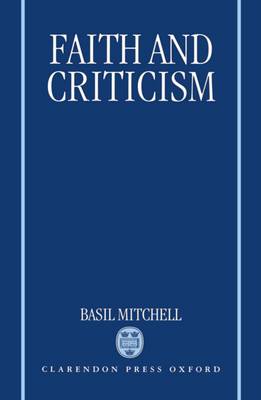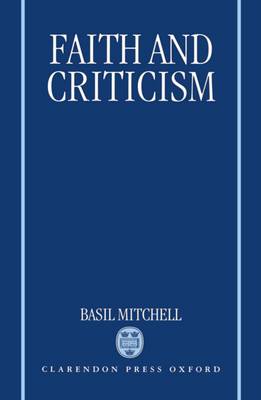
- Afhalen na 1 uur in een winkel met voorraad
- Gratis thuislevering in België vanaf € 30
- Ruim aanbod met 7 miljoen producten
- Afhalen na 1 uur in een winkel met voorraad
- Gratis thuislevering in België vanaf € 30
- Ruim aanbod met 7 miljoen producten
Zoeken
Omschrijving
Faith and Criticism addresses a central problem in the church today--the tension between traditionalists and progressives. Traditionalists want above all to hold fast to traditional foundations in belief and ensure that nothing of value is lost, even at the risk of a clash with "modern knowledge." Progressives are concerned above all to proclaim a faith that is credible today, even at the risk of sacrificing some elements of traditional doctrine. They are often locked in uncomprehending conflict. Basil Mitchell argues that, not only in theology but in any other serious intellectual pursuit, faith and criticism are interdependent. A tradition which is not open to criticism will eventually ossify; and without faith in some established tradition criticism has nothing to fasten upon. This interdependence of faith and criticism has implications for society at large. Religious education can be Christian without ceasing to be critical, and a liberal society can espouse Christian values.
Specificaties
Betrokkenen
- Auteur(s):
- Uitgeverij:
Inhoud
- Aantal bladzijden:
- 178
- Taal:
- Engels
- Reeks:
Eigenschappen
- Productcode (EAN):
- 9780198267584
- Verschijningsdatum:
- 16/02/1995
- Uitvoering:
- Hardcover
- Formaat:
- Genaaid
- Afmetingen:
- 147 mm x 221 mm
- Gewicht:
- 408 g

Alleen bij Standaard Boekhandel
+ 377 punten op je klantenkaart van Standaard Boekhandel
Beoordelingen
We publiceren alleen reviews die voldoen aan de voorwaarden voor reviews. Bekijk onze voorwaarden voor reviews.











